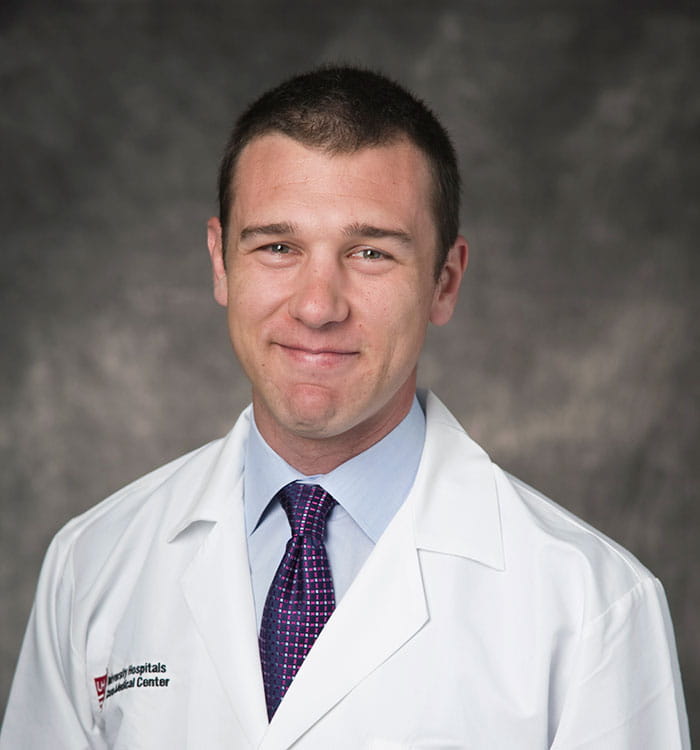Local Manufacture of CAR T Cells Achieving Promising Results for Patients with High-Risk Lymphomas
March 08, 2020
UH Seidman Cancer Center team can culture cells in just eight days
Innovations in Cancer | Winter 2020
 Paolo Caimi, MD
Paolo Caimi, MD
Patients with rapidly progressive refractory lymphomas can be safely and effectively treated with anti-CD19 CAR-T cells manufactured and cultured locally – aided by an abbreviated manufacture process that now takes just eight days. That’s the initial conclusion from a Phase 1 clinical trial of patients with relapsed and refractory B cell non-Hodgkin lymphoma now under way at UH Seidman Cancer Center.
The specific needs of these patients pushed the UH Seidman team to investigate whether they could compress the time required to culture the cells.
“Patients with rapidly progressive disease and urgent need for therapy have worse prognosis, and many are not able to receive CAR T cells in time,” says UH Seidman Cancer Center hematologist/oncologist Paolo Caimi, MD, and Associate Professor of Medicine at Case Western Reserve University School of Medicine. “Decreasing the time from apheresis to infusion can make CAR T cells available to patients with rapid progression of their disease. We had to test the quality and quantity of the cells to ensure that they were safe to be removed from the culture process earlier. We demonstrated that the types of cells that were grown at eight days were the same that you had at the end of the 12 or 13 days. Very few centers are offering locally manufactured cells, many with longer manufacture times.”
Dr. Caimi and the CAR T team from UH Seidman Cancer Center recently presented their experience and results at the annual meeting of the American Society of Hematology (ASH).
For the Phase 1 clinical trial, Dr. Caimi and the UH Seidman team enrolled adult patients with relapsed or refractory CD19+ B cell lymphomas who had failed two or more previous lines of therapy. Data presented at the ASH meeting included information from 12 patients treated through July 30, 2019. Ten of the 12 patients were refractory to the prior line of therapy, five had bulky disease and nine had symptomatic disease at the time of lymphocyte collection.
CAR T cell product manufacture was successful in all patients, conducted locally at the Cellular Therapy Laboratory shared by UH Seidman Cancer Center and Case Western Reserve University. All enrolled patients received their infusion of anti-CD19 CAR-T cells, four in a dose of 500,000 per kilogram, and eight in a dose of 1,000,000 per kilogram. Median apheresis to infusion time was 13 days, with a range between 13 and 20 days, and 10 products were infused fresh. (This window has now been shortened to eight days.)
Among these patients, 73 percent achieved a complete response to CAR T cell therapy. Several new patients have also enrolled in the trial in the last several months, showing similar results.
“We now have 17 patients who have been treated, with 18, 19 and 20 coming soon,” Dr. Caimi says. “Of those 17, we’ve had 12 patients in complete remission. That’s 70 percent, which is a fairly high rate of complete response. Salvage regimens for chemorefractory aggressive lymphoma achieve response rates of approximately 30 percent. Two people have had their cancer return at about the six-month mark. But we already have a couple of people who are a year out without any return of the cancer.”
Going forward, Dr. Caimi says there are still many questions about CAR T cells for this population of lymphoma patients that need to be investigated and resolved.
“Of course, the primary objective of the study is establishing safety,” he says. “We have not seen any dose limiting adverse events and there have not been new toxicities related to the cells beyond what has already been described. Once our patient 18 reaches 30 days, we’re going to start dosing at the 2 million mark. We want to determine if it’s feasible and safe to go up. Also, can we achieve the 2 million dose with eight-day manufacture? We need to define what the best dose for this is.”
“This protocol will serve as a platform for continuing on the dose expansion study, meaning we will treat more patients to find out truly how efficacious it is.,” he adds. “We are going to do this in collaboration with Washington University in St. Louis. Then we want to study whether we should explore other combinations of the cells or other conditioning regimens, to see if we can use this as a platform to investigate more about better ways to administer CAR Ts.”
Questions remain, but Dr. Caimi says he attributes much of the early success achieved to date to the local manufacturing process used here in Cleveland to culture CAR T cells more quickly than are available elsewhere.
“The short manufacture times achieved by local CAR T cell manufacture with the CliniMACS Prodigy enables treatment of a very high-risk non-Hodgkin lymphoma population that would otherwise not be able to receive CAR T products due to rapidly progressive disease,” he says.
For more information about cancer clinical trials, visit UH Seidman Cancer.
For more information on UH Seidman Cancer Center’s experience with locally cultured CAR T cells, please call 216-553-1240.


